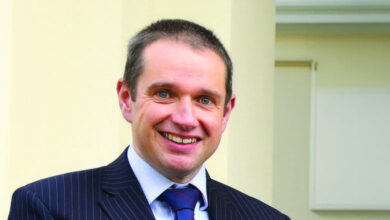Weather pressure
 Richard Halleron outlines how local agriculture has switched into survival mode.
Richard Halleron outlines how local agriculture has switched into survival mode.
Don’t be fooled by the few days of glorious sunshine that we all enjoyed at the end of May. The reality is that the poor weather of the past twelve months has wreaked havoc on production agriculture here in Northern Ireland and put many farming businesses to the pin of their collar.
The atrocious grass growing year that was 2012 meant that almost every farm entered last winter with significantly lower than normal stocks of poor quality silage and hay. These matters were compounded by the fact that the winter stretched on, in reality, until the end of May. Cattle that would normally be at grass by the end of April were still in sheds two months later.
In the meantime many farm businesses ran out of silage and starting buying up stocks of additional fodder on the open market. This increased demand put the price of silage, hay and straw through the roof. For example, by mid-April this year silage prices had broken through the £50 per tonne barrier. In more normal times the equivalent figure would be in the region of £20 per tonne.
As the month of May beckoned, it became obvious that the island of Ireland was about to run out of conserved fodder stocks altogether. In response to this, the Executive at Stormont agreed to the introduction of a fodder scheme, which made available £1 million to cover the cost of importing up to 10,000 tonnes of hay, silage and straw into Northern Ireland from suppliers in England, Scotland and Wales. By the end of the May, this entire fund had been utilised.
So much for the top-line figures. There is no industry as dependent on the weather as is agriculture. Our climate is the key factor that determines the viability of every farming business the world over. Take the case of a dairy farmer in Northern Ireland. During a normal spring month, with the herd at grass, it costs about £1 per head per day to keep the business ticking over. However, the spring of 2013 saw this figure rise to £3 per day, due to the fact that most farmers had no option but to feed expensive bought-in silage and meals indoors. And, of course, these trends were replicated across all the various agricultural sectors.
Significantly, farm gate prices for milk, beef and lamb etc. did not increase in line with the swingeing hikes in production costs incurred by farmers. The end result of all this is a farming sector that has incurred more than significant losses over the past twelve months. Moreover, many producers are facing into the autumn and winter ahead with cash flows at an all-time low.
Thankfully the weather did pick up at the end of May with many livestock farmers getting first cut silage made at that time. However, it will take months for most farms in Northern Ireland to get back on to an even keel – and that’s assuming we get a return to more normal weather patterns for the remainder of 2013.
The last twelve months have seen agriculture in Northern Ireland switch to survival mode. Many farmers will be counting the cost of the problems caused by the poor weather for a long time to come. By its very nature agriculture is a very robust industry. Most farms are set up to handle the vagaries of our normal weather patterns.
But what is actually meant by the term ‘normal weather’? Climate change has been discussed at length within all sectors of our society for the past number of years. For their part farmers have now been left with the following question to answer: has the past year been a one-off event or is this the start of a sustained trend towards cooler and wetter summers? If it turns out that the latter is the case, then local agriculture will have no choice but to invest heavily in new crop/grassland production systems and livestock management practices. And, of course, this will have a major impact on the price we all pay for the food in our shops.





